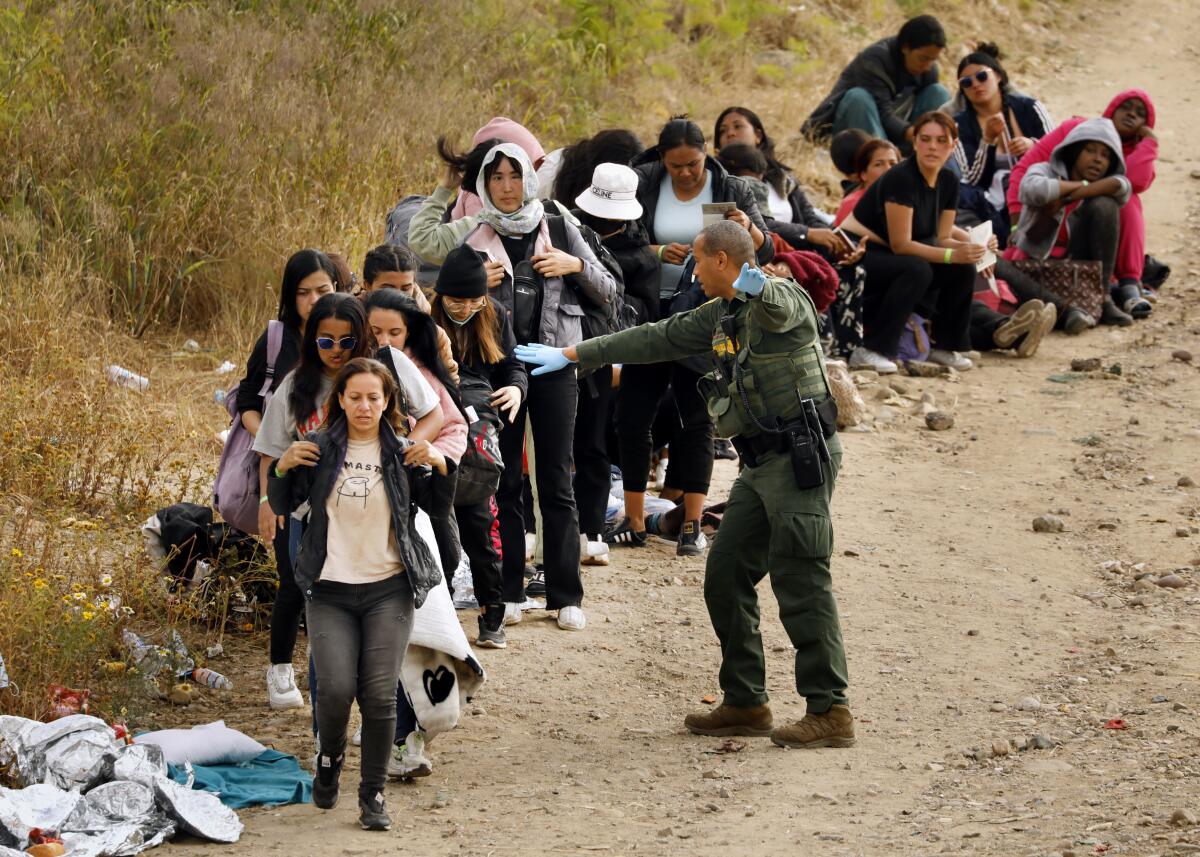In Southern California, immigrant aid groups brace for impact from Title 42’s end

- Share via
On a normal day, workers at the Galilee Center in Riverside County see about 150 immigrants who are in need of clothes, food and a place to stay for a night or two.
Leaders at the nonprofit center say that’s about to change with the expiration of the health statute known as Title 42.
“We’re making sure that we do have enough food and clothing for people ... because we know the numbers are going to go up,” said co-founder Gloria Gomez. “We’re trying to get more things.”
On Thursday, the immigration policy enacted by the Trump administration during the COVID-19 pandemic to keep asylum seekers out of the U.S. expired.
The novel interpretation of the decades-old Title 42 resulted in millions of expulsions of migrants since it was put in place in March 2020. The policy was criticized by some lawmakers, including then-California Sen. Kamala Harris, who called it a “power grab” and an attempt to restrict immigration.
Now that the policy has expired, organizations that provide services to immigrants — such as shelter, food or legal aid — are bracing for impact.
They expect more people, many of whom were once turned back under Title 42, to enter the country in the coming weeks. That could mean a new demand on services and resources that many say are already strained.
At the Galilee Center, in an unincorporated area in Riverside County, Gomez said the organization is already struggling to help about two busloads of people each day coming from other centers near the border that have reached capacity.
On Friday, Gomez said its 40 workers at four shelters haven’t seen the effects of the end of Title 42 but they’re already running low on supplies.
“We’re prepared,” Gomez said, but there’s always a need for more. “We’re running out of sweatpants and underwear.”
Most migrants stay for 24 to 48 hours until they can reach a sponsor or relative.
In the Inland Empire, the Inland Coalition for Immigrant Justice, an organization of about 35 groups that provide services for immigrants in the area, is planning an emergency meeting this week to assess the possible effects of the end of Title 42 on services, including temporary housing, food, clothes and legal aid, a spokesperson said.
Other aid groups in the state are also expecting increased demand, but many have already built an infrastructure and partnerships with local organizations to handle fluctuations in immigration, said Angelica Salas, executive director of the Los Angeles-based Coalition for Humane Immigrant Rights.
“Our hope is that we can try to scale our efforts so we can help out people in the way we are already,” she said. “Yes, we’re looking at expansion, but there’s a foundation from which to work.”
Despite the expected increase, Salas said groups like hers fought to end Title 42.
“We will be ready for additional folks, just like we’ve been challenged in the past,” she said.
Cambria Tortorelli, chief executive of the International Institute of Los Angeles, which provides legal services to people seeking asylum, mainly works with refugees who have applied from their home countries and entered the U.S. legally. The organization also works with some immigrants from Afghanistan who entered the country from the southern border.
The organization has been preparing staff for an anticipated increase in workload, one that will probably strain organizations across the state, Tortorelli said.
“There aren’t enough nonprofit, pro bono services for those that will need them,” she said.
The San Bernardino Community Service Center, which gives legal help to immigrants and asylum seekers, decided to shift strategy for helping immigrants navigate the confusing asylum process due to the end of Title 42.
“We have already gone over capacity,” said Emilio Amaya, executive director of the nonprofit organization. “We’re not going to have the resources to help the people that need it.”
The center can usually handle about 25 cases at one time, and it is already handling double the amount, he said.
“The reality is there aren’t enough private attorneys and, even if there were, people don’t have the money to hire them,” Amaya said.
To help handle the bigger workload, the center will hold educational seminars to help people file their initial paperwork and get their legal proceedings moving, he said.
Many migrants lose their cases simply for not showing up, but the seminars may at least get the ball rolling.
“The idea is that at the very least they have the information to start their cases. While they wait, they can get permission to work and get the resources to maybe hire a private attorney,” Amaya said. “It won’t be the same, but it may help.”
More to Read
Sign up for Essential California
The most important California stories and recommendations in your inbox every morning.
You may occasionally receive promotional content from the Los Angeles Times.














